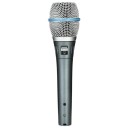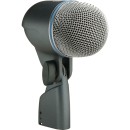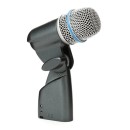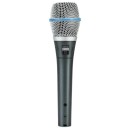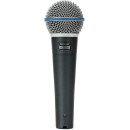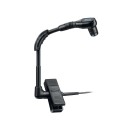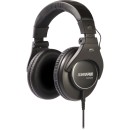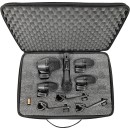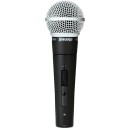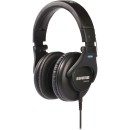Shure Beta 57A Review
Supercardioid Dynamic Microphone
Introduction
In this article, we delve into a detailed analysis of 18,144 user reviews from various languages worldwide to examine the Shure Beta 57A. This analysis is performed by the RR artificial intelligence and updated daily with newly submitted reviews. The RR AI utilizes a complex algorithm to first scrutinize user reviews for credibility, filtering out unreliable ones. It then proceeds to dissect and evaluate the valuable insights within these reviews, providing users with ratings regarding the features of this product. Based on these assessments, users can make informed decisions about whether this product is suitable for them or not.
Ratings Based on Features
These results are a summary of user reviews of the Shure Beta 57A. For example, 93% of 1,996 users who have commented on the Durability of the Shure Beta 57A have given positive feedback.
Highlighted Customer Reviews
Showing 1 to 20 of 64 Reviews
if you can only buy one mic.

Shure Beta 57A Microphone
Reviewed by Guitarsliner on Guitar Center
First, This mic is like a luxurious SM57. If you are a cheapskate, buy an sm57 instead. If you appreciate finer nuances, and a lush brilliance, read on. This was my first mic. It has served double-duty as a vocal and electric guitar mic for about 7 years. This mic has stood the test of time concerning durability and performance. It has a nice heavy,high-quality feel found in mics built for the road. Compared to the sm57, this mic is a little brighter, and dare I say it, fuller. There is a boost in the high mids that makes a singer shine, and a shredder smoke. This mic will handle earth-shattering SPL's from your meanest guitar amp. If you don't appreciate finer details, the sm57 is a great mic. Go buy that one. If you are a perfectionist, and you want one mic to do the job of five, get a beta 57A right now. ... More
Shure beta 57a or Peavy PVi2?

Shure Beta 57A Microphone
Reviewed by SCOTT THOMPSON on Guitar Center
Got the Shure Beta 57A to replace a peavy mic (PVi2) with which I was having serious feedback issues. Turns out it was just my inexperience in locating the mic in relation to the speaker, but I resolved that issue and have been trying them out side by side. The Peavy has a warmer sound, but tends to feed back at a slightly lower volume than the Beta 57A. Especially if I'm using some delay. The Peavy starts screaming at about 11:30 on my volume knob, where the Shure Beta 57A I can get up to 1:30. I should add that my studio is an 8x10 room with rotten acoustics, but it's apples for apples with both microphones. My trials are using a tenor sax. The Peavy is a little longer and has a more bulb shaped head than the Shure. The Peavy has an off/on switch which could be handy in some situations, but since I also play the flute through a wireless mic, I use a volume pedal to mute them both and/or an A/B splitter to switch between the two. Switching to the flutes wireless mic shuts off the sax mic and visa versa. I like this arrangement better because my feet aren't as busy as my fingers, and I don't have to reach for the mic to shut it off.. At first I had buyers remorse when I learned that the feedback issue was my own doing, but having played with both microphones for a while I prefer the Shure Beta57A. I don't think the Shure's feedback superiority is worth three times the price of the Peavy ( Maybe the Shure's build quality might be better?). Best is to go to a music store and try a bunch of microphones out and hear for yourself. Second best is to read reviews and specs from your couch for three weeks like I did and finally bite the bullet. The Shure Beta 57A comes with a plastic zippered bag, nothing outstanding. It comes with it's own "holder" that screws onto your mic stand and has an adapter bushing so it will fit any stand you own. And best of all you get a SHURE bumper sticker, WooHoo. It's a fine mic for the price. You won't be sorry you bought it! ... More
sounds great as a vocal mic also!

Shure Beta 57A Microphone
Reviewed by cdp on Guitar Center
I own a Beta 57 and a Beta 58, as well as a few 'standard' 57's and 58's. By my own ear and after getting several positive comments from vocalists and band members - the Beta 57 is my 'secret weapon' live vocal mic. For the right vocalist, it seems a touch warmer and less harsh than the Beta 58 when pushed. Two different female vocalists that I perform with absolutely love the sound of this mic, and I agree. Through my small/medium venue pa system, with little or no coloring from the EQ, this mic is warm and crystal clear, even when the volume increases. R&B, Jazz, Funk, Reggae and Blues vocalists- don't overlook this mic! ... More
As expected - this is a great mic.

Shure Beta 57A Microphone
Reviewed by Scooter on Guitar Center
I have always used the standard SM58 for my vocals and have also strongly suggested that others in bands that I've been in use it also. In terms of sound, having that quality, consistent sound was important to me. It made doing sound from the stage a lot easier. A friend of mine who is a sound engineer suggested that I try using a Beta 57 for my vocals in particular because he was having a tough time getting my vocals to come through the mix as much as he wanted. I hesitated but figured that since it was so similar to the SM58 that I could probably 'bend' the rules a bit and buy a Beta 57 to throw into the mix. I think he was right and here's why: because everything about the Beta 57 sounds as good as the 58 - *BUT* I think it is just a little "hotter" and as a result my vocals have been a bit more present in the mix. I suspect that is a combination of my mouth being slightly closer to the mic capsule (as the wind screen is flatter and closer) and maybe since it is a "Beta" model unit - the mic capsule itself might be a bit hotter. Regardless - it is a quality mic - just as you would expect if you are used to the legendary SM58. One last note: I actually removed the little blue ring around the windscreen because I wanted to keep the mics on stage looking as similar as possible. (silly I know) I'm from Minnesota - and we have a reputation as being "plain folks" up here. Having that showy "tell tale" blue ring around the windscreen just screams "ostentatious show-off!" (it is just rubber and can be put back on very easily.) Great mic! ... More
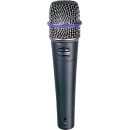
Shure BETA 57A Supercardioid Dynamic Instrument Microphone
Reviewed by Wilhelm S. on Reverb
Are there better mics out there now? Of course. What I found that I like most about this mic is that it pretty much has that SM57 sound only not quite as thin/bright and it handles processing and effects very well (which I don't think the SM57 does, especially in the high end). It is fashionable to hate on the SM57 but people who have been recording/engineering for a long time seem to mostly agree that half of the enduring popularity of that mic is not that it is the best sounding mic ever, but that it usually just does what is needed and sits in the mix with very little fuss (the other half is down to being practically bulletproof). So take that and add to the fact that the Beta 57a is a bit more flexible - and is supercardioid - and I think the Beta is a real winner in the sense of being a workhorse - it's not going to blow you away if you solo it in a mix, but it will do what you need it to and do it well for many years to come. Honestly, I found the Beta to be kinda meh initially but, after testing it out a bit more, it proved its usefulness. I recently bought a few different mics to try out and decide on one mic that would be best suited for scratch vocals (I do have a trusty old SM57 from the 90s but knew there were better mics now - I would be remiss for not mentioning the SE V7, which I may keep even though it's a bit redundant for my purposes) and decided this was the best for potentially having a scratch vocal be the final and also as a "blank slate", in case I decide to keep that vocal and end up processing the shit out of it - most likely adding another vocal track with a condenser mic. It probably bears mentioning that I actually like the sound of the SM57 on my vocals (baritone) and that was my only mic for a long time so it isn't surprising that I like the Beta but, as I said, I wasn't impressed initially. Another note - I think a lot of people on Reverb probably know that fake Beta 57a's are pretty abundant. Do some research on spotting a fake before buying secondhand. ... More
Ads















Great Acoustic Harmonica Mic

Shure Beta 57A Microphone
Reviewed by Mark Friedman on Guitar Center
Just tried out the Shure Beta 57a for harmonica on an acoustic gig. Fantastic mic for the price (runs around $135). Picks up clearly the subtleties of rhythm harp at around one foot away with some great bass proximity effects when you move in to around few inches from the mic for a lead. The tone is both warm and crisp filling in some of the mids that are normally missing from my Marine Band Crossovers on an acoustic set up and bringing out the beef on my Marine Band Deluxes and Blue Midnights. Think I might even use it in some of my home recording projects as well, even though it cost less than half of the AKG C2000 I current use for acoustic harp home recording! Think it might be almost comparable in sound quality to some of the ribbon mics I have used in various studios with much more of gritty live vibe. Mad Dog Friedman www.maddogharp.com ... More
The SM57 on steroids

Shure Beta 57A Microphone
Reviewed by blue1music on Guitar Center
This is a great mic and only a little bit more than the sm 57 which is always a great mic on its' own. I love to use these for amps and snare drums.They really handle wuite a signal with great gain before feedback ratio. When using condensors gets risky for live music,this is also a great mic for acoustic instruments.
Solid Mic - great for Instruments

Shure Beta 57A Microphone
Reviewed by Craig Miller on Guitar Center
I bought this from GC because I was in need of an all purpose mic. My primary need was to mic guitar amps with my secondary use for vocals. For instruments I couldn't be more pleased. I mic a 15w Fender Blues junior and even a small 5w Gretsch tube amp and the mic really picks up the amps personality as well as the single coil fender guitars and humbucker in myLes Paul. Regarding vocals, I can't give a lot of feedback. Some sound checks and limited singing indicate it will be just fine. It does seem slightly milder or smoother than perhaps a 58 but I don't have the ability to do a side-by-side so I'm just going from memory and we all know how memory and sound are - not always accurate to hold up in a court of law. Assess your needs but if what you need to do is mic an instrument I'd look long and hard at the 57A. I don't think you will be disappointed. ... More
Reliable and versital with eq

Shure Beta 57A Microphone
Reviewed by Mark Millan on Guitar Center
I bought this microphone about 5 years ago, I have done a lot of studio recording with this mic and was able to achieve transparency and a veriety of great sound with a parametric eq. Its smooth, neutral on vocals and instruments, midrange is aggressive when eq is bypassed. guitar cabinets and drums sound best with a parametric eq.
Warm Sound

Shure Beta 57A Microphone
Reviewed by Lee Miyauchi on Guitar Center
I just purchased this mic and I was blown away. I use this microphone for vocals. My voice is clear and gives a warm prescence. I like to sing variety styles of music, and this microphone picks up a balance frequency.
All around perfect!

Shure Beta 57A Microphone
Reviewed by Peter on Guitar Center
Perfect mic for hot headed vocalist with raging pipes, as well as amps and drums. I have always been a fan of the 57 and 58, and the beta kicks the tone clarity up a notch. GC is always on top of the price and service. Good purchase at any time!
Hands Down, Amazing

Shure Beta 57A Microphone
Reviewed by Matt Torres on Guitar Center
I personally do not own the microphone. I use it for when I practice with my band at my drummer's (belongs to her) house. The microphone pick up great on the vocals and project a very loud and clear tone when spoken into. We've recently used it to pick up on the drums and amps for recordings and its great. I would recommend this mic to any singer, vocalist, musician, etc. Truly you get what you pay for.
Shure Beta 57A Microphone Review

Shure Beta 57A Supercardioid Microphone with Stand and Cable Kit
Reviewed by Ronald on B&H Photo Video
Well, I was very impressed with the sound quality of my voice using the Shure Beta 57a. Even though many recording engineers use this mic as an instrument (guitar) mic I think it is also a great vocal mic as well. Now, I just recently used it for my Zoom meetings. People were amazed by the sound quality of my voice. I am constantly getting compliments using the Shure Beta 57a. Great mic at a great mic. You can't go wrong with Shure's quality. Ron Ajemian - Audio Technology Educator
This turned out to be the exact mic I wanted after studying many microphones.

Shure BETA 57A Supercardioid Dynamic Instrument Microphone
Reviewed by Matthew W. on Reverb
The Shure Beta 57A is exactly what I was looking and listening for as a lead vocalist who sings for many hours at a time. If your voice gets bassy the longer you sing then this mic is a great choice. It also works great with the harmonizers and effects I use in a live setting. I have no regrets spending a few extra dollars purchasing a BETA 57A!!!
Studio Staple Mic!

Shure BETA 57A Supercardioid Dynamic Instrument Microphone
Reviewed by John A. on Reverb
Use it on vocals, instruments.. anything you can imagine! The Beta57a will catch the sounds with a crispness often reserved for much more $$$ microphones. These will never let you down, never break, and certainly never sound bad. Great job, Shure!
Solid!

Shure Beta 57A Microphone
Reviewed by Dan M. on Guitar Center
I have used this mic for vocals in rock clubs many times. Decided to pick one up myself finally. Great microphone, solidly built. Much richer sound for vocals versus a plain SM57 or SM58.
A worthwhile option.

Shure Beta 57A Supercardioid Microphone with Stand and Cable Kit
Reviewed on B&H Photo Video
It's a nice alternative to the SM-57 on snare. So far, I prefer it. I haven't used it on anything else. But it is the next step in my quest to transcend the SM-57 on snare, which is an unexpectedly difficult endeavor.
Meh !

Shure BETA 57A Supercardioid Dynamic Instrument Microphone
Reviewed by Ardy M. on Reverb
I recently bought a Beta 57A & a Beta 58A, neither of them compare to a basic Senheiser for less money. I'm not impressed. IN fact they don't do much more than the basic Shure 57 & 58
Shure Beta 57A Microphone

Shure Beta 57A Microphone
Reviewed by Herman on Guitar Center
I have had great performance from the Shure Beta 57A Microphone for vocals. I plan to also use two microphones on each side of my daughter's acoustic accordion for both live performance and recording. The Shure microphones are built tough and reliable. I highly recommend the Beta 57A Microphones.
Good sound, solid, dependable

Shure Beta 57A Supercardioid Microphone with Stand and Cable Kit
Reviewed by Leonard S. on B&H Photo Video
I use the Beta 57 to amplify voices for a public board of education at remote meetings around the district. The mics' supercardioid pickup pattern provides excellent volume before feedback. It is a solid all-around performer that also sounds very good on recorded music performances.
